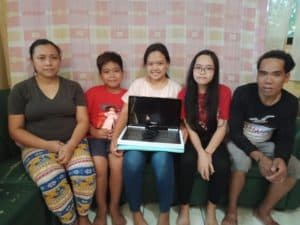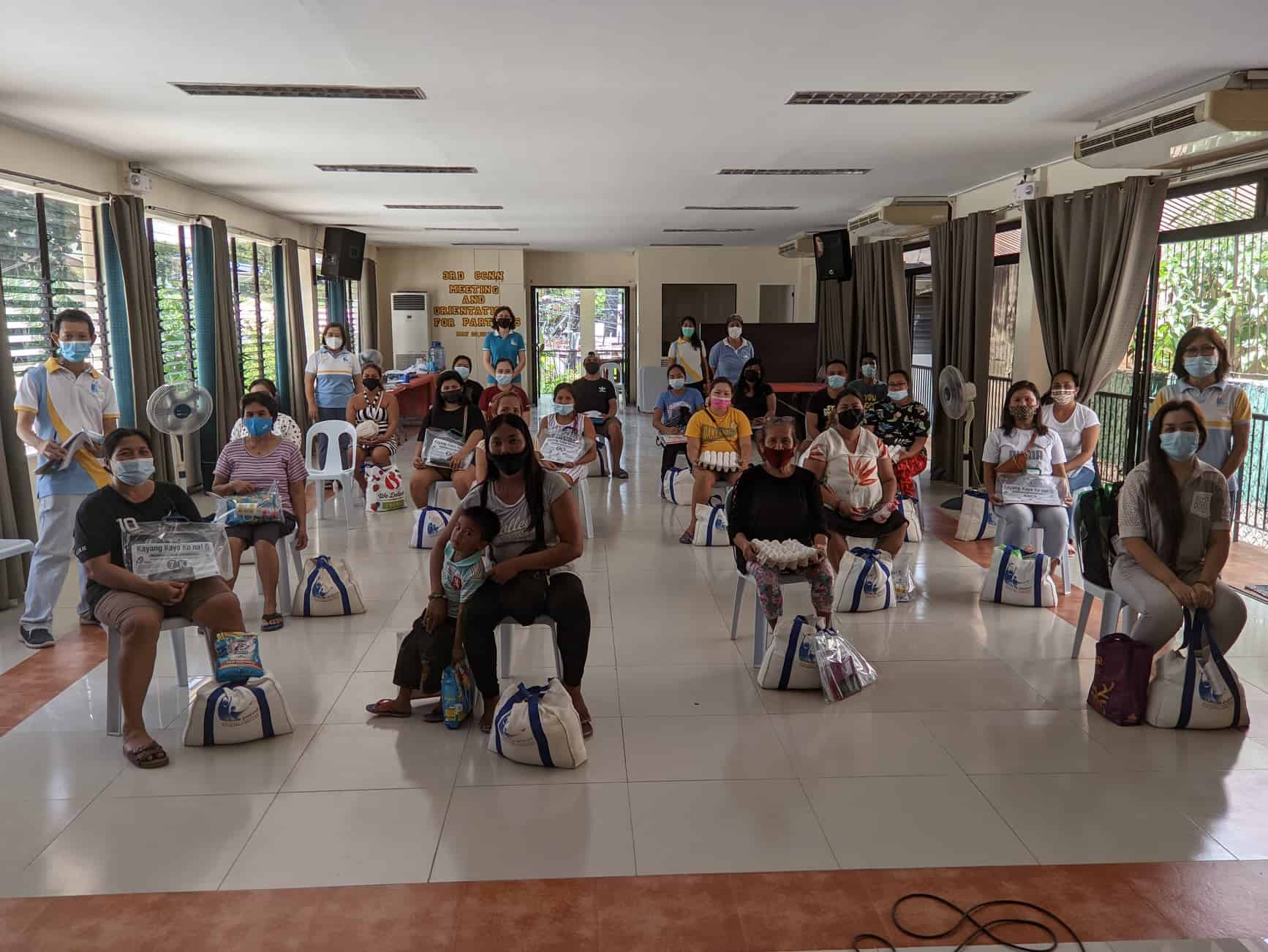While Christmas is fast approaching, we cannot but bring you our little gift: the life that continues to flourish even in the midst of so much suffering and difficulties, expressed in the faces and stories of the children, teens, and families of Bukas Palad. It is a life in which we have the privilege of being witnesses, contributing to our work and with your help from a distance. Enjoy reading!
“School of Life” for parents.
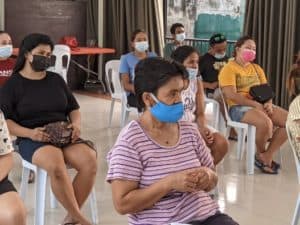 Bukas Palad’s approach to helping the poorest families is not just about financial support. A regular human and spiritual formation of children and parents is also important. One step at a time, we try to foster a new mindset that recognizes the fundamental dignity of each person also the drive to live for others, to spend oneself for them, building a family and a community based on respect, reciprocal love, and welcoming diversity. It is on this basis that many personal and family difficulties are overcome, and where lasting resolutions and choices are born that orient each one’s life to the good.
Bukas Palad’s approach to helping the poorest families is not just about financial support. A regular human and spiritual formation of children and parents is also important. One step at a time, we try to foster a new mindset that recognizes the fundamental dignity of each person also the drive to live for others, to spend oneself for them, building a family and a community based on respect, reciprocal love, and welcoming diversity. It is on this basis that many personal and family difficulties are overcome, and where lasting resolutions and choices are born that orient each one’s life to the good.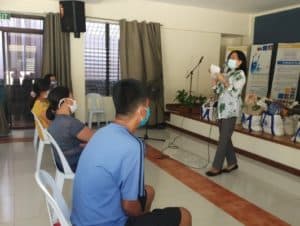 The formation course for parents is called “School of Life”; families, trainers, and experts in various fields deal with topics such as the foundation of love in the couple and the value of marriage, responsible motherhood and fatherhood, natural family planning, communication between spouses and with the children, relationship with the community, care for the environment, etc. And also other issues like how to manage a family budget, live the culture of giving, take care of healthy nutrition, personal and home hygiene, accompany the growth of children in the various phases of physical and mental development, and how to practice positive discipline with them. In a questionnaire to parents at the end of the seminars, we ask “Has the School of Life changed your attitude towards your husband/wife, your children, your community?”. Here are some of the answers: “I
The formation course for parents is called “School of Life”; families, trainers, and experts in various fields deal with topics such as the foundation of love in the couple and the value of marriage, responsible motherhood and fatherhood, natural family planning, communication between spouses and with the children, relationship with the community, care for the environment, etc. And also other issues like how to manage a family budget, live the culture of giving, take care of healthy nutrition, personal and home hygiene, accompany the growth of children in the various phases of physical and mental development, and how to practice positive discipline with them. In a questionnaire to parents at the end of the seminars, we ask “Has the School of Life changed your attitude towards your husband/wife, your children, your community?”. Here are some of the answers: “I 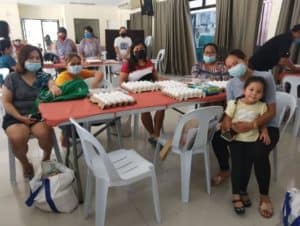 lessened shouting in the family, and I gave more space to the virtue of mutual listening, in order to have peace and more understanding”. “I try to be responsible for the environment and the community where I live, for example keeping clean around the house and segregating garbage”, “When I receive providence and food packages, I share them with our neighbors in need”; “I have learned that it is important to create moments of dialogue and sharing of affection in the family”; “We want to plan our wedding”; “I learned that to be a good parent I have to build a good relationship with my children, listening to them and having an open dialogue with them”, “I understood how to communicate with my husband, through the various languages of love”.
lessened shouting in the family, and I gave more space to the virtue of mutual listening, in order to have peace and more understanding”. “I try to be responsible for the environment and the community where I live, for example keeping clean around the house and segregating garbage”, “When I receive providence and food packages, I share them with our neighbors in need”; “I have learned that it is important to create moments of dialogue and sharing of affection in the family”; “We want to plan our wedding”; “I learned that to be a good parent I have to build a good relationship with my children, listening to them and having an open dialogue with them”, “I understood how to communicate with my husband, through the various languages of love”.
The urban gardening project in relocated communities.
Another aspect of the formation for parents is developing entrepreneurial skills and helping the family to provide for their basic needs, starting with food. In Pit-os and Binaliw communities, in the hills outside Cebu city, there are many families who have been relocated by the government, due to the demolition of some urban slum areas. This area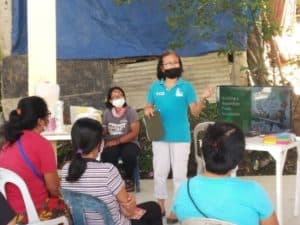 is under development, and essential services such as water supply and infrastructures are still not fully functional. Several Bukas Palad families live there. With the pandemic outbreak, unemployment hit these families hard, especially daily income earners, such as construction workers, jeep or motorcycle drivers for public transport, and street vendors. Without any daily income, the main problem was no longer the pandemic, but what to put on the table three times a day if possible. To cope with the emergency, Bukas Palad continued to distribute monthly food packs to the families. To work toward a more resilient community, Bukas Palad conducted in partnership with CAFEi Community for Alternative Food Ecosystems Initiative
is under development, and essential services such as water supply and infrastructures are still not fully functional. Several Bukas Palad families live there. With the pandemic outbreak, unemployment hit these families hard, especially daily income earners, such as construction workers, jeep or motorcycle drivers for public transport, and street vendors. Without any daily income, the main problem was no longer the pandemic, but what to put on the table three times a day if possible. To cope with the emergency, Bukas Palad continued to distribute monthly food packs to the families. To work toward a more resilient community, Bukas Palad conducted in partnership with CAFEi Community for Alternative Food Ecosystems Initiative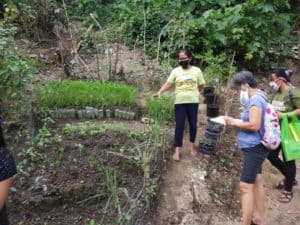 five weeks of training for 20 leaders on organic farming techniques, production of natural fertilizers, and cultivation of vegetables for domestic consumption. Each leader was responsible for training at least other five families. Each family participating in the project received tools and raw materials to start planting, using recycled pots and other containers, or in the backyard. Jessica, one of the mothers who joined the project, shares: “From the beginning of the pandemic, my husband lost his job and we really didn’t know what to do. Thanks to Bukas Palad, we continued to receive monthly food packs. Then the CAFEi experts taught us how to grow vegetables, which kind and at what time of year, and how to save the seeds. Now we have fresh vegetables on our table, we help each other, we meet regularly to see how production is going ahead and what difficulties there are “. The Pit-os-Benaliw community model is now spreading to other communities and the leaders who have been trained started to come up with their own associations, in order to develop livelihood projects.
five weeks of training for 20 leaders on organic farming techniques, production of natural fertilizers, and cultivation of vegetables for domestic consumption. Each leader was responsible for training at least other five families. Each family participating in the project received tools and raw materials to start planting, using recycled pots and other containers, or in the backyard. Jessica, one of the mothers who joined the project, shares: “From the beginning of the pandemic, my husband lost his job and we really didn’t know what to do. Thanks to Bukas Palad, we continued to receive monthly food packs. Then the CAFEi experts taught us how to grow vegetables, which kind and at what time of year, and how to save the seeds. Now we have fresh vegetables on our table, we help each other, we meet regularly to see how production is going ahead and what difficulties there are “. The Pit-os-Benaliw community model is now spreading to other communities and the leaders who have been trained started to come up with their own associations, in order to develop livelihood projects.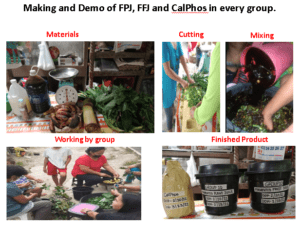
Provision of equipment for online classes.
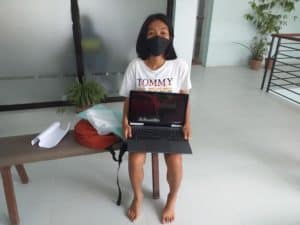 For the second consecutive year, schools remain closed, and lessons continue to be held online or in a module-based class. For many students, it has been a difficult year, for the sense of isolation and distance from peers, the limited presence of the teachers, and having to deal with lessons by themselves. Some students are lucky enough to have parents who can help them, but not all.
For the second consecutive year, schools remain closed, and lessons continue to be held online or in a module-based class. For many students, it has been a difficult year, for the sense of isolation and distance from peers, the limited presence of the teachers, and having to deal with lessons by themselves. Some students are lucky enough to have parents who can help them, but not all.
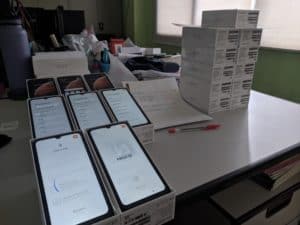
Sense of discouragement and frustration and even the desire to quit school are feelings often arising. Bukas Palad staff tried to maintain close contact with each student, to support their motivation to study and has activated a network of “tutors” among students themselves (see “Ate and Kuya initiative” in the previous update). Furthermore, thanks to the funds raised through AFN Azione per Famiglie Nuove we were able to equip more than 800 children and youth of all Bukas Palad Centers in the Philippines with gadgets suitable for online classes. Laptops for college students, smartphones for high school, a contribution for monthly internet connection, and load for mobile phones on a monthly basis have been provided. Thanks to internet access, students can research topics for further explanations, keep in contact with teachers and peers, and exchange learning materials. In the coming months, we aim to provide smartphones to other high school students. While we hope that face-to-face classes will soon resume, we try in every way to accompany our students by offering them all the help they need.